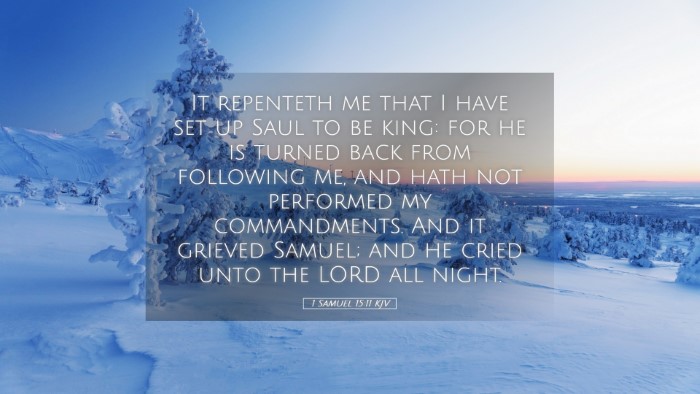Commentary on 1 Samuel 15:11
1 Samuel 15:11 states: "It repenteth me that I have set up Saul to be king: for he is turned back from following me, and hath not performed my commandments." This verse encapsulates a pivotal moment in the narrative of the Old Testament, reflecting God's relationship with His chosen people and their leaders. Below, we explore insights from various public domain commentaries to provide a comprehensive understanding of this passage.
Overview of the Context
In 1 Samuel 15, God commands Saul to utterly destroy the Amalekites and all they possess due to their historical enmity towards Israel. Saul's failure to fully adhere to this divine command leads to God's regretting the choice of Saul as king, which indicates a deep relational dissonance between God and Saul.
Theological Implications
This verse raises profound theological questions regarding divine sovereignty, human agency, and the notion of repentance attributed to God. It suggests that God's intent and purposes can be challenged by human disobedience.
Commentary Insights
Matthew Henry's Commentary
Matthew Henry emphasizes that Saul’s disobedience resulted in God's grief over Saul's kingship. He notes that God's "repentance" here is anthropopathic—attributing human feelings to God to express the seriousness of Saul's unfaithfulness.
- On God’s Repentance: Henry argues that God’s statement reflects His displeasure and disappointment rather than a change of mind—a concept hard to understand in light of His omniscience.
- Saul’s Error: Henry underscores that Saul’s decision to compromise God’s command led to evident divine disapproval, marking a didactic moment for both Saul and all leaders concerned with fidelity to God’s instructions.
Albert Barnes' Notes
Albert Barnes provides a detailed exposition on the cultural and political implications of Saul’s disobedience. He suggests that the regret expressed by God serves not only as a reflection of connectedness with His creatures but also highlights the consequences of leadership failure in spiritual contexts.
- The Sovereignty of God: Barnes discusses how Saul's moral failures incited God's judgment. He concludes that God’s pronouncement serves as a reminder of the seriousness of straying from divine paths, reinforcing the requisite for leaders to be wholly aligned with God’s will.
- Consequences of Disobedience: The failure of Saul is seen as both a personal tragedy for him and a collective one for Israel. Barnes emphasizes the community's part in Saul's choices, suggesting a broader theological lesson for all congregants.
Adam Clarke's Commentary
Adam Clarke dives into the Hebrew terms used within this verse, revealing significant nuances. He emphasizes that God's "repentance" (הִנֵּחַ) reflects His displeasure, as He does not delight in the downfall of His chosen leaders.
- Interpretation of the Hebrew: Clarke interprets the concept of repentance as a divine response to human actions, aligning with traditional Jewish thoughts on temperance and justice.
- Warning to Future Leaders: Clarke presents this passage as a forewarning to Israel's future kings, encouraging them to preserve divine mandates and remain righteous to avoid such divine lamentation.
Practical Applications
In light of these commentaries, several practical applications arise for pastors, students, and theologians:
- Leadership Accountability: Leaders are urged to note that their spiritual and moral choices have far-reaching consequences, not only for themselves but for the communities they serve.
- Understanding Divine Displeasure: The discourse around God's "regret" teaches that disobedience may invoke divine grief, prompting leaders to strive for alignment with God’s commands.
- Encouragement to Obedience: This passage reinforces the importance of obeying God fully and establishing a relationship based on trust and fidelity, essential for any spiritual leader.
Conclusion
1 Samuel 15:11 is a powerful verse that speaks to the heart of leadership and the dynamic relationship between God and His chosen people. By examining the insights from Matthew Henry, Albert Barnes, and Adam Clarke, we gain a richer understanding of the complexities involved in divine-human interaction, the responsibilities of leadership, and the everlasting truth of God's nature.


